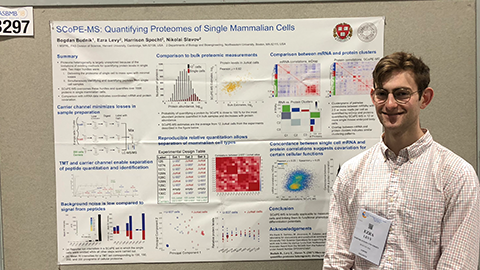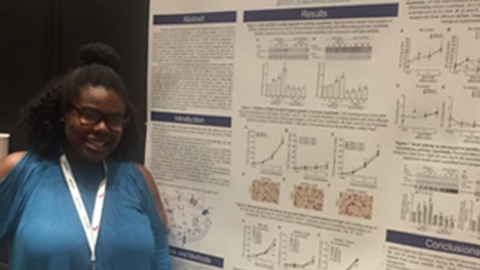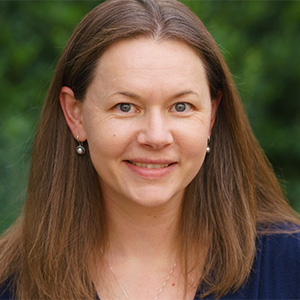Tips for mentors headed to the undergrad poster competition
One of the many fantastic events of the American Society for Biochemistry and Molecular Biology annual meeting happens quite early: the undergraduate poster competition. Alive with youthful energy and ideas, it also can be a crowded and intimidating place!
If you are a faculty member bringing one or more undergrads to compete, how can you help them to get the most out of it? Here are five things that you may want to convey to them.

1. Help them to understand how the event fits into the overall scheme of the annual meeting.
Take the time to describe the distinctions between what it will be like to present at an undergrad-only poster competition and what it will be like in the full meeting later. These two experiences are very different!
Emphasize how positive it is for them to participate in an event that is designed especially for them and their peers and how well it will prepare them to present to a wider audience later in the meeting.
2. Help them to understand the timeline that leads up to the event.
Many undergrads never have participated in a meeting like this before. The abstract-submission process, the separate registration for competition, and then the separate registration for the meeting itself (not to mention booking the travel and accommodations) — it can all seem a little daunting. Creating a checklist with deadlines can help to keep everything on track.
Also, students frequently have questions about how and when to have their posters printed and how to transport them to the meeting, so your recommendations are useful to include here as well.
2022 ASBMB Undergraduate Poster Competition
This year’s competition will take place from 10:30 a.m. to 4 p.m. on Saturday, April 2, in Philadelphia.
Applications for the competition will open in January.
Participation is required for Student Chapters Travel Award recipients but is open to all undergraduate members of the ASBMB.
To qualify for the competition, a student must have submitted an abstract, as a first author, to an ASBMB topic by Nov. 30, 2021.
More info.
3. Help them to understand the progression for the day of the event.
Students arrive from all over but need to be in attendance at the late-morning Saturday orientation for the poster session. Since many students likely are traveling either the night before or the morning of the event, this makes it difficult for them to be well rested. Help them to arrange for travel that will get them to the orientation in as relaxed a manner as possible.
Students also frequently have questions about the dress code. A good guideline might be to dress as if for an interview if it will increase your confidence, but otherwise nice casual clothing will work well and might be easier to pack.
Finally, make sure that they are aware of instructions regarding when and for how long to be physically attending their poster.
4. Help them to understand the judging and scoring process.
It can help if your students are aware of some of the typical features of the judging process. Although judges have individual styles (for example, some like to start by reading the poster quietly to themselves, while others begin right away with a “Please take me through your poster” request), there are a few general features to expect.
First, you can reassure your students that judges should be clearly identifiable with labeled nametags and that they should be introducing themselves at the beginning. Students shouldn’t fear that they won’t realize they were presenting to a judge.
Second, it can be helpful for your students to know that judges overwhelmingly love undergraduate research! There were a wide variety of other things that the many participating judges could have been doing that day, but they chose to volunteer to try to help the event to run smoothly with the aim of helping students with their professional development.
In other words, judges want undergrads to succeed and to become ever more confident and practiced in presenting their work, so when a student begins their presentation, it can be helpful to imagine that they are speaking to a supportive and interested colleague.
Finally, it can be helpful to know that judges are working from a rubric — the details might change from year to year, but in general an excellent poster presentation will score highly across a range of criteria that you can speak to your students about ahead of time (clear verbal and written explanation of hypothesis, methods, results, conclusions and future work, and additionally addressing follow-up questions during or after the presentation).

5. Help them to understand how the experience can fit into their professional development.
Think about the kinds of skills that you have developed over time at scientific conferences: assimilating novel information, making new connections with peers and other professionals, becoming less nervous and more concise as you explain your personal area of expertise, and so much more.
Your students can, of course, practice this throughout the duration of the meeting, but it’s worth highlighting to them how great the early gains can be during this particular undergraduate-focused event.
Still, no matter how much you encourage your students to be proactive and meet other people, it’s helpful if you facilitate this for them at least on this first day of the meeting — particularly if you are bringing only one student. If you and your student don’t know any other students who are attending, you could try reaching out to your Student Chapters regional directors to see if they can connect you with other attendees from your area.
Bonus tip
Don’t forget to take a photo of your student with their poster. The time moves quickly, and later you will want to remember how proud you all were to be able to participate in this dynamic knowledge exchange!
Enjoy reading ASBMB Today?
Become a member to receive the print edition four times a year and the digital edition monthly.
Learn moreFeatured jobs
from the ASBMB career center
Get the latest from ASBMB Today
Enter your email address, and we’ll send you a weekly email with recent articles, interviews and more.
Latest in Careers
Careers highlights or most popular articles

From humble beginnings to unlocking lysosomal secrets
Monther Abu–Remaileh will receive the ASBMB’s 2026 Walter A. Shaw Young Investigator Award in Lipid Research at the ASBMB Annual Meeting, March 7-10 in Washington, D.C.

Chemistry meets biology to thwart parasites
Margaret Phillips will receive the Alice and C. C. Wang Award in Molecular Parasitology at the ASBMB Annual Meeting, March 7-10 in Washington, D.C.

Decoding how bacteria flip host’s molecular switches
Kim Orth will receive the Earl and Thressa Stadtman Distinguished Scientists Award at the ASBMB Annual Meeting, March 7–10, just outside of Washington, D.C.

Defining JNKs: Targets for drug discovery
Roger Davis will receive the Bert and Natalie Vallee Award in Biomedical Science at the ASBMB Annual Meeting, March 7–10, just outside of Washington, D.C.

Upcoming opportunities
No matter where you are in your career and what future path you aspire to, everyone needs leadership skills. Join ASBMB for practical strategies for building and practicing leadership skills.

Close out ASBMB 2026 with a bang
The closing reception of the 2026 ASBMB Annual Meeting will be held at the Torpedo Factory Art Center in Alexandra, Virginia.

